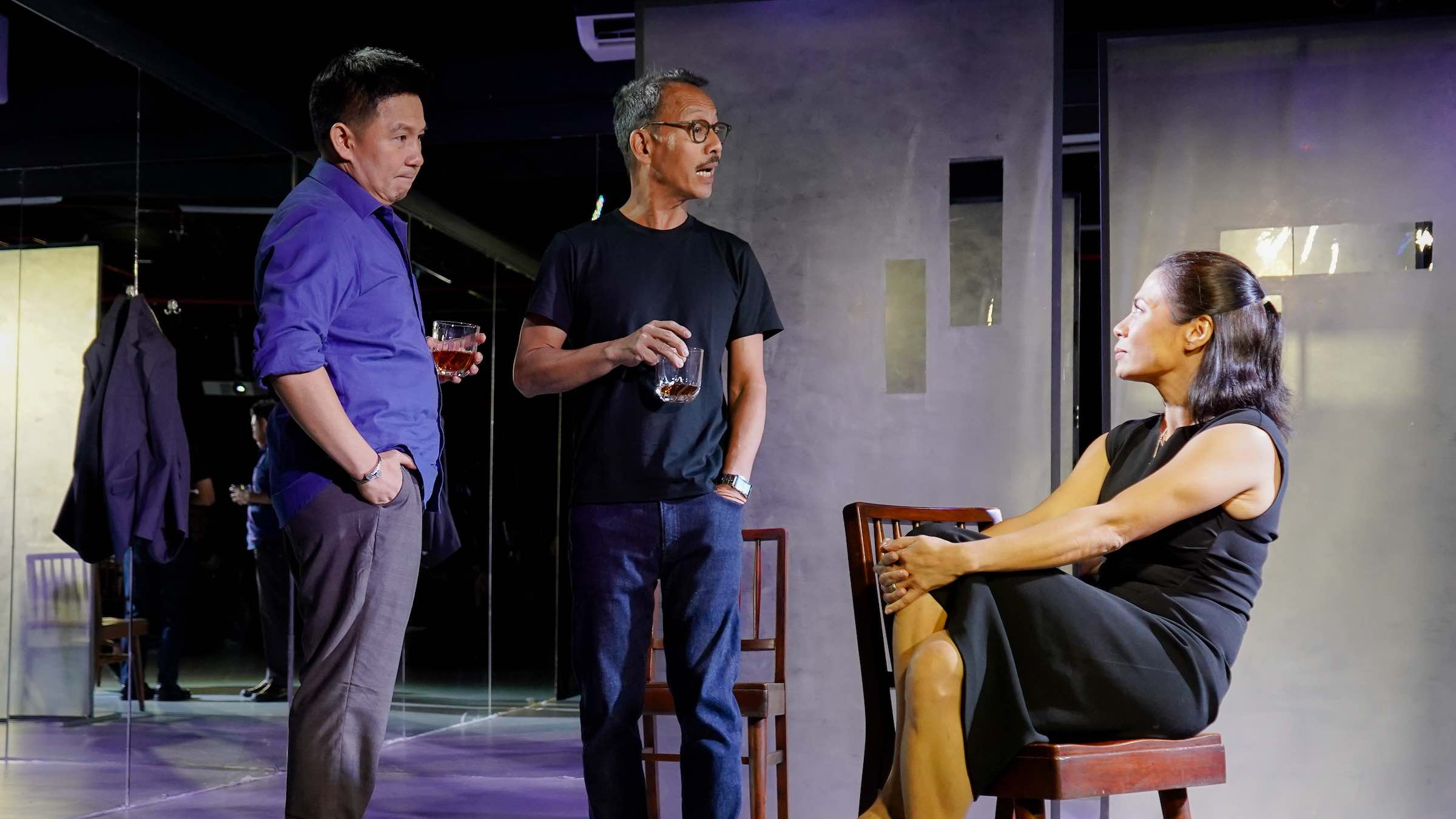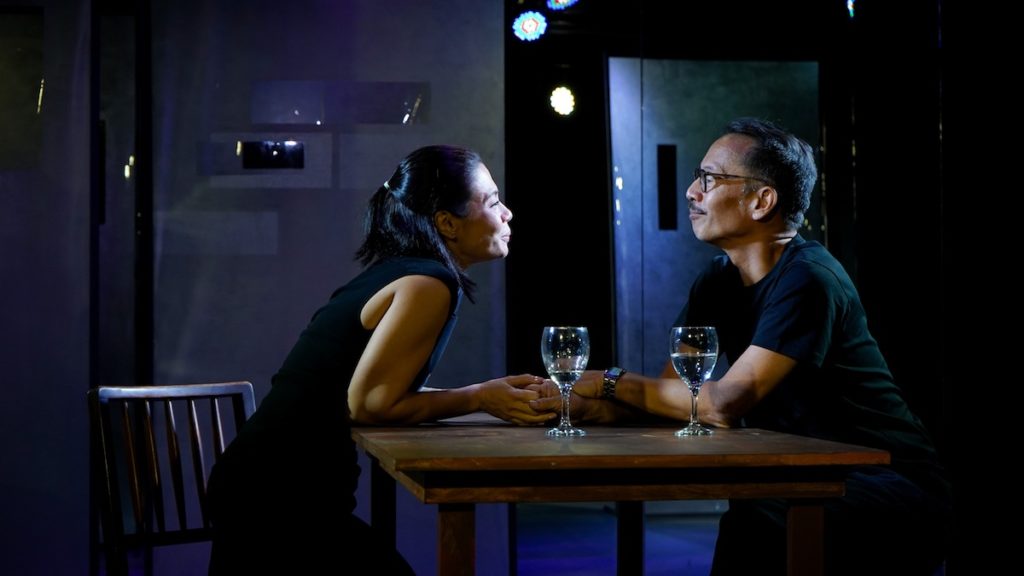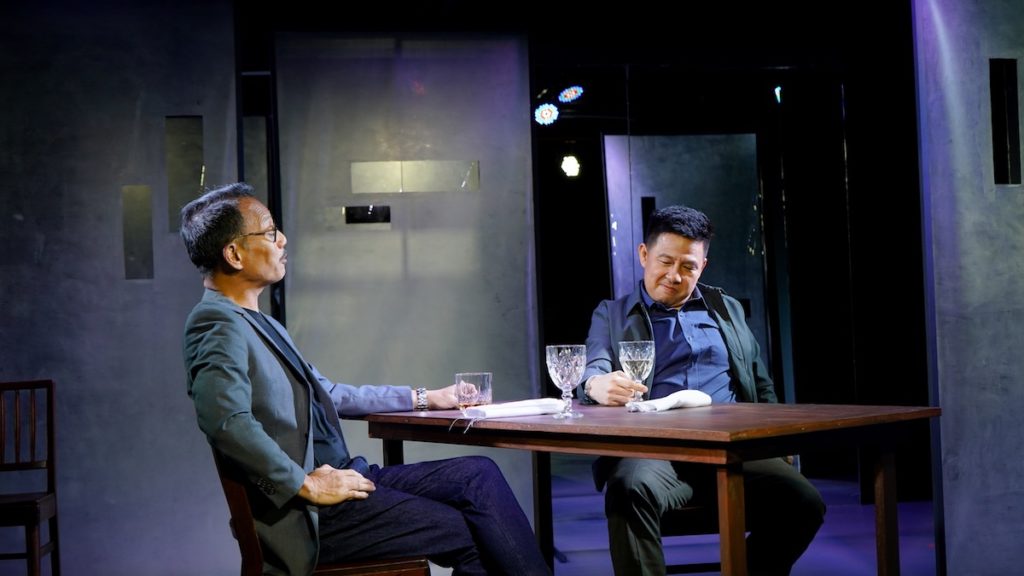Presented by Stages Production Specialists, Inc. and MusicArtes, Kaliwaan, a new Filipino translation by Guelan Varela-Luarca of Harold Pinter’s Betrayal, presents a fresh, raw narrative from August 22 to 31, 2025 at the Mirror Theater Studio. The play traces the emotional fallout of a seven-year affair between a woman and her husband’s best friend. As the story rewinds, audiences are pulled deeper into a world where trust fades, love is negotiated, and desire comes at a cost. It’s a quiet, intimate exploration of the secrets we keep and the lies we tell to protect the love we believe we deserve.
Unraveling a Tapestry of Deceit and Desire
Kaliwaan unfurls a quiet, agonizing tapestry of love and deceit, following Emma (Missy Maramara), her husband Robert (Ron Capinding), and his best friend Jerry (Nor Domingo). The play, however, is not a simple linear story. Instead, it moves backward in time, beginning with Emma and Jerry’s reunion after their affair has ended and tracing their clandestine relationship back to its beginning. The narrative, like a memory, peels back layers of deception and suppressed emotion, with each scene revealing a new, unsettling truth. The first act is a quiet, contemplative unraveling of the affair’s aftermath. We witness the characters in their present, grappling with the echoes of their past actions and the quiet tension that lies beneath their polite exchanges.
(All Photos by Myra Ho)
However, as the play progresses, we witness the small betrayals and moments of self-deception that led to this quiet catastrophe. The second half reveals the messy, complicated fallout of these lies and the fragile foundation of their relationships. The play delves into the unspoken, the things left unsaid that carry more weight than anything spoken aloud. We are left to piece together the fractured narrative, witnessing the insidious way in which deceit corrodes not only relationships but the very essence of the individuals involved. The play is a haunting exploration of how secrets fester, and how love and lies become intertwined in a way that is almost impossible to untangle.
Stripped Bare: Staging and Performances
Loy Arcenas’s direction for Kaliwaan strips away all that is inessential, resulting in a stark, jarring authenticity. The minimalist set design by Charles Yee and the intimate venue creates a raw atmosphere. There are no grand gestures or lavish settings to distract from the emotional turmoil of the characters. This rawness draws the audience in, plying them with the guilty pleasure of eavesdropping on tense, dramatically charged scenes. The audience is made to feel like a voyeur, a silent witness to the quiet unraveling of lives. This intimate presentation places the focus squarely on the actors, their every flicker of emotion, every subtle shift in posture, and every unspoken word. It’s an unflinching look at the messy, complicated realities of love and deceit, presented with a surgical precision that leaves nowhere to hide.
The nuanced portrayals of the cast were front and center given the stark staging. Maramara, as Emma, showcased a deft spectrum of emotions, shifting from coy and affectionate to icy and distant at the turn of a coin. Her performance was a masterclass in subtle shifts, conveying a lifetime of unspoken feelings in a single glance. Capinding’s Robert exuded a simmering, subtle sense of menace, a quiet storm of suspicion and hurt just beneath the surface of his composed demeanor. And Domingo, in the role of Jerry, played his character with a confident ease that expertly hid a primal, almost bestial obsession. The three actors’ performances were a perfect storm of tension, their unspoken words and charged silences doing more to advance the story than any dialogue ever could.
Imperfections and a Resonant Translation
While Kaliwaan excelled in its intimate staging and powerful performances, the production wasn’t without its flaws. The most notable issue was the pace of the first half of the play, which felt sluggish at times. The quiet, contemplative nature of the scenes, while essential to the play’s tone, occasionally bordered on a standstill. While this deliberate pacing likely aimed to build a sense of tension, it sometimes tested the audience’s patience, making the initial unraveling of the affair feel more like a slow crawl than a steady burn.
That being said, the choice to translate the play into Filipino imbued the material with a profound emotional weight and resonance. Varela-Luarca’s translation, “Kaliwaan,” moved beyond a simple word-for-word conversion, capturing the nuances of Filipino relationships and the unspoken feelings that often carry more weight than dialogue. The calculated politeness of the original English is traded for the disarming familiarity of Tagalog, making the characters’ actions and motivations feel more intimate and deeply personal to a Filipino audience. This linguistic and cultural shift created a powerful connection, making the small, quiet betrayals feel even more devastating and relatable.
An Essential Experience for the Discerning Viewer
Kaliwaan is a vital reminder of the depth and purpose of theater. It’s an invitation to elevate the artistic conversation beyond frivolous, popular, crowd-pleasing musicals and embrace more cerebral, thought-provoking fare. This production, with its raw honesty and complex emotional landscape, demonstrates that local theater can—and should—tackle challenging human experiences with grace and intelligence. If you are a theatergoer seeking a story that respects your intelligence, that forces you to confront the messy truths of love and deceit, then Kaliwaan is an essential experience. It is a testament to what Philippine theater is capable of when it chooses to be brave, intimate, and unapologetically real.
Visit PalabasTayo.com for more stories on film, TV, music, theater, art, fashion, food and other general lifestyle and entertainment topics like this. You may also follow and subscribe to our social media accounts: Facebook, YouTube, Instagram, TikTok, X, and Kumu.
























